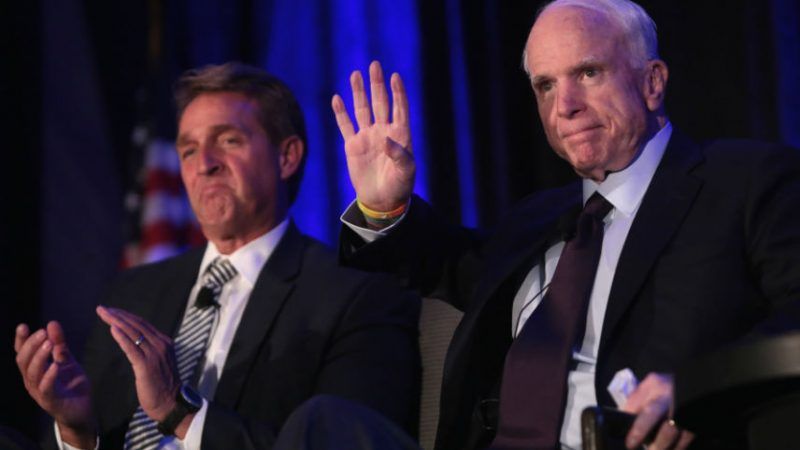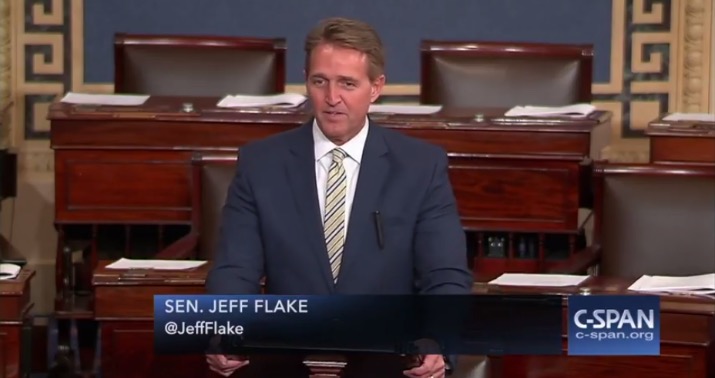What's Missing from John McCain's Criticism of Trump's Media Attacks
McCain and Jeff Flake are right to slam the president's juvenile rhetoric, but questionably blame Trump for global trends while neglecting the press crackdowns of his predecessor.


Today is a particularly punchy round in the ongoing heavyweight bout that is the Trump presidency vs. the media, a conflict that is arguably a defining divide in our modern politics. In one corner, as always, is President Donald Trump, who has promised to unleash his long-awaited "Fake News Awards" tonight. In the other corner, as per usual, is just about every mainstream news outlet and journalism-related organization (sample headline from Newsweek: "President Trump Is Leading an Assault on Democracy in the U.S. and Around the World, Report Claims"), plus all the late-night comedians, a scattering of #NeverTrumpers, half of political Twitter, and the two Republican senators from Arizona.
The senior senator from the Copper State, John McCain, took time away from his ongoing health battles to fire a shot across Trump's bow in today's Washington Post, under the journalist-pleasing headline "Mr. President, stop attacking the press." The piece, which has already drawn much praise, hinges on a dubious bit of connective tissue between Trump's juvenile anti-media taunts in America, and the various ongoing crackdowns on journalists abroad:
While administration officials often condemn violence against reporters abroad, Trump continues his unrelenting attacks on the integrity of American journalists and news outlets. This has provided cover for repressive regimes to follow suit. The phrase "fake news" — granted legitimacy by an American president — is being used by autocrats to silence reporters, undermine political opponents, stave off media scrutiny and mislead citizens. [The Committee to Protect Journalists] documented 21 cases in 2017 in which journalists were jailed on "fake news" charges.
First off, the phrase "Fake News" initially gained currency among the very journalism practitioners Trump is whacking with it today. Second, let's click on that hyperlink above and reflect on the opening paragraph:
For the second consecutive year, a record number of journalists--262--were imprisoned, and President Donald Trump's anti-journalist rhetoric provides cover for the trumped-up accusations and legal charges. That is according to the Committee to Protect Journalists. The figure, as of Dec. 1, was up from 259 in the previous 12-month period.
That's right—the (already way too high) number of journalists imprisoned worldwide increased during President Trump's first year in office by, um, three; none of whom were in the United States. And this is primarily Trump's fault. (No seriously, the CPJ, in honor of the Fake News Awards, announced its own "Press Oppressors awards," and the prize for "Overall Achievement in Undermining Global Press Freedom" went to, you guessed it, the U.S. president.)
This is what happens when you are triggered more by words than by policy. Barack Obama, unlike his successor (so far at least!) actually prosecuted, threatened with jail time, and spied on American journalists and whistleblowers. As Reporters Without Borders pointed out last year,
[I]t bears repeating that [Trump's] predecessor left behind a flimsy legacy for press freedom and access to information. Journalists continue to be arrested for covering various protests around the country, with several currently facing criminal charges. The Obama administration waged a war on whistleblowers who leaked information about its activities, leading to the prosecution of more leakers than any previous administration combined….And over the past few years, there has been an increase in prolonged searches of journalists and their devices at the US border, with some foreign journalists being prevented from any travel to the US after they covered sensitive topics such as Colombia's FARC or Kurdistan.
McCain and other Trump critics are on firmer ground when they complain that the president has shown little inclination to criticize other countries' media crackdowns, that he has eschewed the tradition of insisting on press conferences even in the most autocratic of foreign countries, and that his "enemy of the people" rhetoric is (in the words of Jeff Flake on the Senate floor today) "shameful" and "repulsive." I might also add that the president's fondness for lying his face off, calling for various journalists to be fired, and threatening to "open up" libel laws is an embarrassment to his supporters, to his political party, and to the whole country.
So what to do about that stuff, aside from calling it out in real time (hopefully with a sense of proportion about what the guy can actually do)? McCain's suggestions include:
[E]ncouraging our partners and allies to review their laws and practices, including the abuse of defamation and anti-terrorism laws, to better protect press freedom and ensure that they do not unduly shrink the space for free speech. We can authorize U.S. foreign assistance to support independent media outlets and programs that create greater media pluralism. We can do more to foster conditions in which freedom of expression and information can thrive, including working to change increasingly political attitudes toward journalism. And we can condemn violence against journalists, denounce censorship and support dissidents and activists as they seek to speak the truth.
Bolding mine to indicate a wince. There is a long and not always pretty history of the U.S. government funding journalists and media outlets abroad; such a relationship does not strike me as a generator of independence. (It's also very easy for authoritarians to crack down on journalists on or perceived to be on Washington's payroll.) I am all in favor of condemning violence against journalists and providing moral support to dissidents and activists attempting to speak freely; it's the material support (beyond stuff like opening up a good embassy library) that can easily become counter-productive.
On the other hand, I'm heartened by McCain's serial flagging in his Op-Ed of the way anti-terrorism laws and national security considerations can be employed to restrict speech, since that's not a connection many hawks usually make, especially about America's own laws.
National security is the place where America's rhetorical commitment to transparency and constitutional liberty goes to die. The Supreme Court's very justification for government secrecy, 1953's United States v. Reynolds, was based on the Air Force searching for a noble-sounding excuse to cover up a fatal airplane crash that we later learned had nothing whatsoever to do with top-secret anything. If it were up to McCain, tech companies wouldn't allow individuals to encrypt their communications and devices, foreign visitors would have more of their social media history combed through by federal agents, and social media companies would be forced to follow the same disclosure rules as print and broadcast when it comes to disclosing the purchases of political ads—all in the name of national security. He also wishes government could punish Americans for burning their country's flag.
McCain may have some inspiring words today about the free press "hold[ing] repressive governments accountable," but when Daniel Ellsberg leaked the U.S. government's own Pentagon Papers 45 years ago McCain's first reaction was to volunteer to testify against Ellsberg at trial. (The senator's reaction to Edward Snowden? That he's "no hero," and obviously working for Vladimir Putin.) He has also talked about the existence of "good leaks," such as the cache of damning photos from Abu Ghraib, so his record isn't one-sided on the issue, but the point remains that arguably the most urgent place for the United States to walk the walk when it comes to the nexus of secrecy and liberty is in its own domestic laws and enforcement.
Having senators from his own party pulverize the president over his cartoonish anti-media campaign is a welcome sight. Hopefully the Arizona duo can follow up that gesture by focusing on areas where existing Washington power has already been wielded against journalists and their sources in the course of them contributing to a free and vibrant press.
Today's related Reason video:


Show Comments (107)